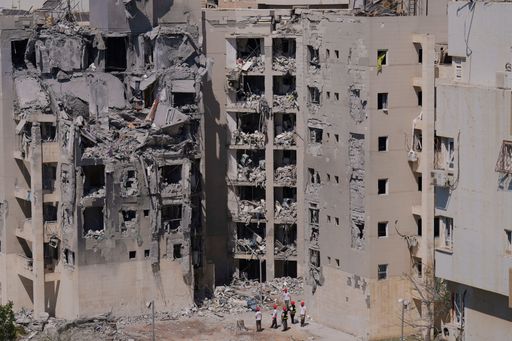President Donald Trump has said the United States will hold talks with Iran over its nuclear programme next week, following a 12-day conflict with Israel that drew in the US and left hundreds dead and wounded.
Speaking to reporters on Wednesday, Trump claimed recent US air strikes had led to the "total obliteration" of Iran's nuclear capabilities, setting the programme back "decades".
He added that the ceasefire he announced earlier in the week was "going very well."
However, a leaked US intelligence assessment seen by American media suggested the strikes may have delayed Iran's nuclear efforts by only a few months.
The United States joined the fighting in support of Israel, targeting three nuclear facilities in Iran.
Two were hit by bunker-buster bombs, while the third was struck by a guided missile fired from a US submarine.
"They're not going to be building bombs for a long time," Trump said, adding that discussions with Iran were expected "next week."
He added: "We may sign an agreement. I don’t know."
Iranian President Masoud Pezeshkian has said his government is open to talks, but would continue to "assert its legitimate rights" to develop nuclear energy for peaceful purposes.
Iran's Foreign Ministry spokesperson Esmaeil Baqaei said that some nuclear sites had been "badly damaged."
But the US Defense Intelligence Agency, in a report cited by US outlets, claimed the American strikes did not destroy Iran’s centrifuges or its stockpiles of enriched uranium.
Instead, some facility entrances were sealed without eliminating underground structures.
Trump's intelligence chiefs also pushed back on Wednesday.
CIA Director John Radcliffe in a statement said that new intelligence from a "historically reliable" source indicated that "several key Iranian nuclear facilities were destroyed and would have to be rebuilt over the course of years."
Trump also said on Wednesday that the US has not given up its maximum pressure on Iran - including restrictions on sales of Iranian oil - but signaled a potential easing in enforcement to help the country rebuild.
"They're going to need money to put that country back into shape. We want to see that happen," Trump said at a news conference at the NATO Summit when asked if he was easing oil sanctions on Iran.

US hits back at accounts Iran moved uranium
Also on Wednesday, the White House rejected reports that Iran moved enriched uranium before US air strikes.
"I can tell you, the United States had no indication that that enriched uranium was moved prior to the strikes, as I also saw falsely reported," White House Press Secretary Karoline Leavitt told Fox News.
"As for what's on the ground right now, it's buried under miles and miles of rubble because of the success of these strikes on Saturday evening," she said.
Some US media had cited concerns that around 400 kilogrammes of enriched uranium may have been relocated before the strikes — possibly hidden elsewhere in the country.
The quantity of uranium had been reported by the UN nuclear watchdog, the International Atomic Energy Agency, with which Iran is considering severing cooperation after the Israeli and US strikes on its nuclear programme.
"The IAEA lost visibility on this material the moment hostilities began," the agency's chief, Rafael Grossi, told France 2 television. But he added: "I don't want to give the impression that it's been lost or hidden."

The 12-day conflict between Iran and Israel was the most intense confrontation between the two sides to date.
Israeli aggression hit nuclear and military targets, as well as civilian areas, killing hundreds including scientists and senior military officials, according to Iran's Health Ministry.
It stated that at least 627 civilians were killed, the majority of whom were civilians.
Iran's missile and drone attacks left 28 people dead in Israel while destroying dozens of buildings and causing Tel Aviv billions in losses.



















